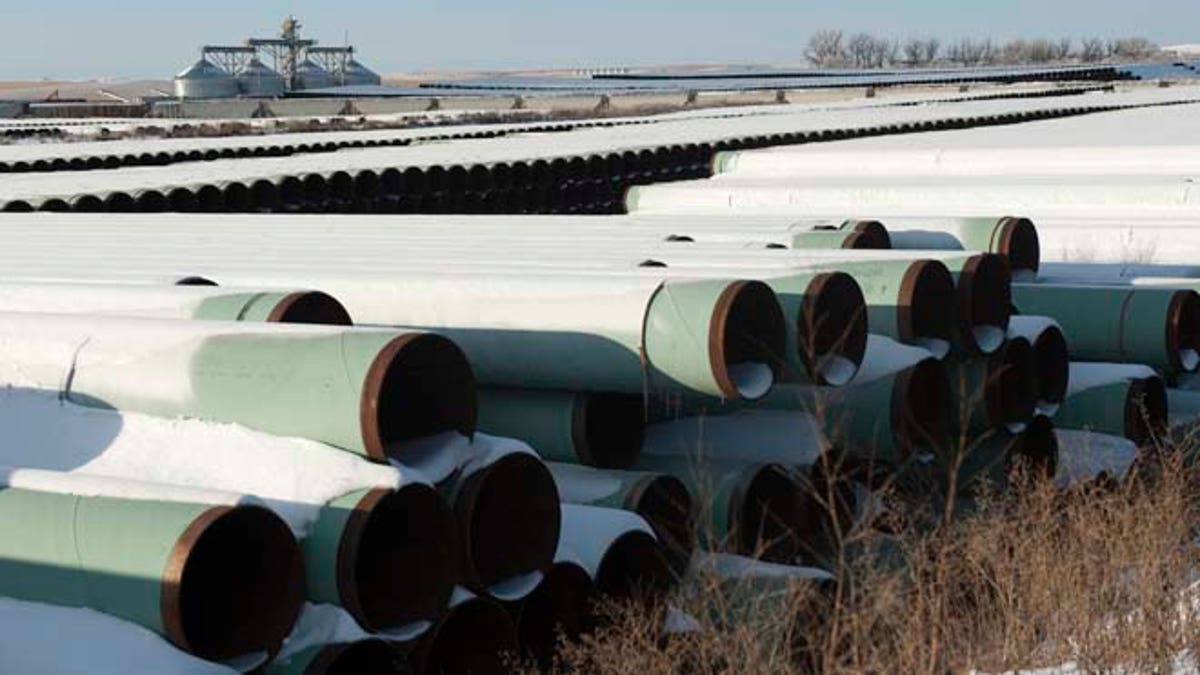
This Nov. 14, 2014 photo shows a depot used to store pipes for Transcanada Corp's planned Keystone XL oil pipeline in Gascoyne, N.D.
The White House on Tuesday threatened to veto fresh legislation approving the controversial Keystone pipeline, setting up a likely showdown between President Obama and the new GOP-controlled Congress over one of Republicans' top agenda items.
"If this bill passes this Congress, the president wouldn't sign it," White House Press Secretary Josh Earnest said Tuesday, stressing that the president wants to wait for a State Department review process to finish.
Republicans, with several Democratic supporters, were introducing the Keystone legislation on Tuesday as their first order of business for the new Congress.
The White House, which until now had stayed mum about whether President Obama would sign the bill, issued the veto threat within minutes of the 114th Congress convening.
On the Senate side, sponsors Sen. John Hoeven, R-N.D., and Sen. Joe Manchin, D-W.Va., said the bill has 60 co-sponsors, and uses Congress' authority to regulate interstate commerce to green-light the Canada-to-Texas pipeline. They predicted at least 63 senators, and possibly more, ultimately will vote for the bill -- more than enough to pass.
The House is expected to vote and pass a bill approving the $5.4 billion project, which was first proposed in 2008, on Friday.
Should the bill pass and face a presidential veto, the big question is whether congressional leaders, then, could muster the two-thirds majority needed to override. Manchin also suggested Congress could respond to a veto by attaching the Keystone measure to another bill.
Hoeven and Manchin blasted the White House for the veto threat Tuesday afternoon.
"Instead of a veto threat, the president should be joining with Congress on a bipartisan basis to approve the project for the American people, rather than blocking it on behalf of special interest groups," Hoeven said in a statement.
Manchin, who is often at odds with the administration, said he was "disappointed that the president will not allow this Congress to turn over a new leaf and engage in the legislative process to improve an important piece of legislation."
The head of the American Petroleum Institute, Jack Gerard, said Tuesday after his annual speech on the state of U.S. energy that the president had failed to make a simple decision that would put people to work, but he predicted the pipeline would eventually be approved.
"It doesn't bode well for relationships between the White House and Capitol Hill," Gerard said of the veto threat.
The bill is identical to one that failed to pass the Senate by a single vote in November, when Democrats were in control and Sen. Mary Landrieu of Louisiana pushed for a vote to save her Senate seat. She lost to Republican Rep. Bill Cassidy, who sponsored the successful House bill approving the pipeline.
But now the odds of passage are much improved with the Republican takeover of the Senate. The bill will also test Republicans' commitment to more open debate. Hoeven and Manchin said they welcomed additions to the bill, which they hoped would increase support.
In recent months, Obama has been increasingly critical of the project, and has resisted prior efforts to fast-track the process. At his year-end news conference, Obama said the pipeline would benefit Canadian oil companies but would not be a huge benefit to American consumers, who are already seeing low prices at the pump thanks to oil prices, which on Monday dipped to a nearly six-year low and were sharply down again Tuesday.
In addition, the outcome of a Nebraska lawsuit over the pipeline's route through that state is still pending. Another challenge to the pipeline is being waged by a South Dakota tribe over renewal of an application for a permit.
The project by Calgary-based TransCanada would move tar sands oil from Canada 1,179 miles south to Gulf Coast refineries. Supporters say it would create jobs and ease American dependence on Middle East oil. A government environmental impact statement also predicted that a pipeline would result in less damage to the climate than moving the same oil by rail.
Critics argue that the drilling itself is environmentally harmful, and said much of the Canadian crude would be exported with little or no impact on America's drive to reduce oil imports.
The Associated Press contributed to this report.












































